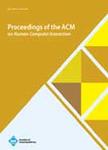版权所有:内蒙古大学图书馆 技术提供:维普资讯• 智图
内蒙古自治区呼和浩特市赛罕区大学西街235号 邮编: 010021

作者机构:Georgia Institute of Technology School of Interactive Computing United States Virginia Tech Department of Computer Science United States University of Michigan School of Information United States
出 版 物:《Proceedings of the ACM on Human-Computer Interaction》 (Proc. ACM Hum. Comput. Interact.)
年 卷 期:2018年第2卷第CSCW期
页 面:1–25页
核心收录:
基 金:We thank the social computing group at Georgia Tech and the Social Media Research Lab (SMRL) at University of Michigan for their valuable inputs that improved this work. Chandrasekharan and Gilbert were supported by the National Science Foundation under grant IIS-1553376. Eisenstein was supported by the National Science Foundation under award RI-1452443 and by the National Institutes of Health under award number R01GM112697-01
摘 要:Norms are central to how online communities are governed. Yet, norms are also emergent, arise from interaction, and can vary significantly between communities—making them challenging to study at scale. In this paper, we study community norms on Reddit in a large-scale, empirical manner. Via 2.8M comments removed by moderators of 100 top subreddits over 10 months, we use both computational and qualitative methods to identify three types of norms: Macro norms that are universal to most parts of Reddit;meso norms that are shared across certain groups of subreddits;and micro norms that are specific to individual, relatively unique subreddits. Given the size of Reddit’s user base—and the wide range of topics covered by different subreddits—we argue this represents the first large-scale study of norms across disparate online communities. In other words, these findings shed light on what Reddit values, and how widely-held those values are. We conclude by discussing implications for the design of new and existing online communities. © 2018 Copyright held by the owner/author(s). Publication rights licensed to the Association for Computing Machinery.